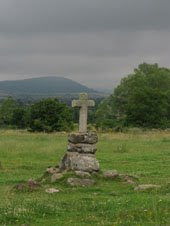 Sadly, you get used to it. And quickly too. The flowering of crumpled tissue, white mostly, or pink, that gathers at the foot of trees and to the side of bushes just inches from the path. Anywhere that is half an hour's walk from picnic tables or a water tap: the moment nature comes a-calling you realise that hundreds were there before you. But nobody thinks to bury their leavings. It can't be pleasant for any local person who dares to go for a walk.
Sadly, you get used to it. And quickly too. The flowering of crumpled tissue, white mostly, or pink, that gathers at the foot of trees and to the side of bushes just inches from the path. Anywhere that is half an hour's walk from picnic tables or a water tap: the moment nature comes a-calling you realise that hundreds were there before you. But nobody thinks to bury their leavings. It can't be pleasant for any local person who dares to go for a walk.Then there's the trail of drinks cans
 and bottles, wrappings from cereal bars or chocolate, the thin twists of paper from bocadillos and tortillas bought in a bar and eaten along the way. It's as if all these pilgrims really are planning to walk back again, leaving a little waste-paper trail to find their way home.
and bottles, wrappings from cereal bars or chocolate, the thin twists of paper from bocadillos and tortillas bought in a bar and eaten along the way. It's as if all these pilgrims really are planning to walk back again, leaving a little waste-paper trail to find their way home. The squalor sinks in deep and stays. We drop our rucksacks onto the dust at a lunch stop rather than look for a clean bit of ground or a grassy bank to put them on. There aren't any. And somehow dry dirt doesn't seem as dirty as wet
 mud. Our clothes, eight months on, are stained with sweat, rust and random blotches. We scarcely bother to brush the dust off our hats any more, much less wash then. In hostels, it's hard to hog the water long enough for a thorough wash so a faint overlay of soap has to thrash it out with the stale sweat. In such conditions tired feet don't really get clean, and start to smell.
mud. Our clothes, eight months on, are stained with sweat, rust and random blotches. We scarcely bother to brush the dust off our hats any more, much less wash then. In hostels, it's hard to hog the water long enough for a thorough wash so a faint overlay of soap has to thrash it out with the stale sweat. In such conditions tired feet don't really get clean, and start to smell.There's a kind of moral squalor too. Once one person has dropped a wrapper or pushed their way through a fence, the others think it's alright to do the same. The plaques fixed to pillars to point pilgrims in the right direction are routinely stolen as souvenirs - by the pilgrims themselves.

It's wearying, this squalor, the more deeply we sink into it. But as I again decry the failure of Spanish villages to set up public toilets to prevent the desecration of their countryside, I'm reminded that no one should suffer squalor, a lack of hygiene, a lack of clean water. If we can't put up with it for a few weeks, how can it be enough to say of others "They've never known any different, it's what they're used to," or "They wouldn't know how to use a toilet"? Everyone has the right to and should be found the resources for clean water and proper sanitation, and everyone knows it.
Meanwhile, pilgrims on the Camino de Santiago could take a long
 hard look at their behaviour and give a thought to those following behind and all the people who have to live along the path of their rubbish.
hard look at their behaviour and give a thought to those following behind and all the people who have to live along the path of their rubbish.3rd September 2008





































































No comments:
Post a Comment